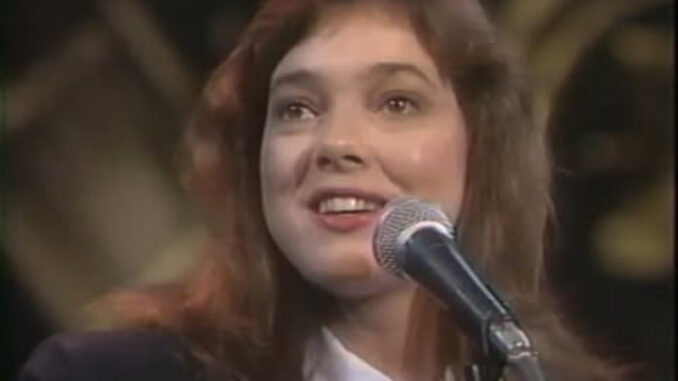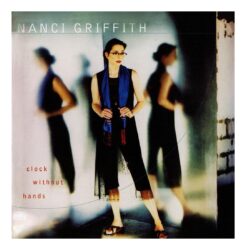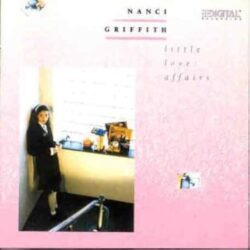
Writing about music generally forces you to adopt a critical stance; it’s not enough to say ‘I like this’ or ‘I don’t like that’, you have to drill a little deeper to try to find a way to contextualise it for the reader. The truth is, it’s almost impossible to find a good reason to like or dislike something – it’s all about the gut. I would find it hard to justify my ongoing love for bubblegum pop above Beethoven or Cole Porter – but you’re still more likely to find me listening to the Archies or the Raspberries. This article makes it even harder, as the implication is that we are going to write about an artist who has had a major impact in our life – and then spend half of it dissing them. So be it. Let’s go.
Nanci Griffith was probably my first introduction to the world that would become Americana – that off-the-mainstream, slightly roots and country place, where, in my formative years, there suddenly appeared the likes of Nanci, Mary Chapin Carpenter, Steve Earle and Lyle Lovett – others too, but these were the ones that grabbed me. And Nanci most of all, for reasons that the 19-year-old me couldn’t quite process. Since then, I’ve come to realise that she showed there could be strength in gentleness, offering reassurance is a superpower, and respecting the ones that came before doesn’t mean we can’t keep trying to move towards a better world.
Also, I loved her music! I loved the acoustic guitars, fiddles, banjos, pianos all blending together into something like folk or country but with a fresh edge. I loved her sing-song tone and her quirky, off-beat humour (her live introductions to songs are the stuff of legend). Indeed, the first record that I loved by her was the “One Fair Summer’s Evening” live collection – but I’ve already written about that in these pages, so I’m going elsewhere today.
Can’t Live With It – “Clock Without Hands” (2001)
 Following 1997’s somewhat patchy “Blue Roses From the Moons”, “Clock Without Hands” arrived without much expectation on my part, though I still had to rush out and get it on the first day of release (that’s how we used to roll, kids!) I listened to it and instantly found my expectations justified. I have returned to it every few years out of a sense of duty to my love of the artist – and honestly, it has yet to engage me.
Following 1997’s somewhat patchy “Blue Roses From the Moons”, “Clock Without Hands” arrived without much expectation on my part, though I still had to rush out and get it on the first day of release (that’s how we used to roll, kids!) I listened to it and instantly found my expectations justified. I have returned to it every few years out of a sense of duty to my love of the artist – and honestly, it has yet to engage me.
The songwriting feels forced, like a writer who feels she has to say something of import, but no longer has the creative impetus to do it. The arrangements are dull and the melodies lacking; it isn’t terrible – it’s almost worse than that, it’s boring. Why would I bother listening to this when I can hear her sing ‘Banks of Pontchartrain’ or ‘Working In Corners‘ or ‘There’s a Light Beyond These Woods (Mary Margaret)’ or any number of others? There are some tracks here that are not too bad – ‘Midnight In Missoula’, ‘Truly Something Fine’, ‘Cotton’ – these are all ok songs, that if they were the extra tracks around something wonderful, they would be fine. Unfortunately, they’re the best ones.
Overall, it feels like a record made by an artist for whom it is their job to make a record, rather than someone who really has something new to give to the world. Don’t get me wrong, it is important for artists to be allowed to develop as they get older, and some may find it difficult to maintain the initial creative burst that first brought them to the public’s attention. Even the likes of Springsteen, Dylan, Joni Mitchell and Steve Earle have been hit and miss at times, so in that sense Nanci is no exception. But for me, the title track seems to accurately represent the record here:
”I’m a clock without hands – I’m just ticking, and that’s all”.
Can’t Live Without It – “Little Love Affairs” (1988)
 This could possibly be seen as the last of a trilogy of albums from her very peak period, following “Lone Star State of Mind” (1987) and “The Last of The True Believers” (1986). It opens with the yearning, heart-string tugging ‘Anyone Could Be Somebody’s Fool’ (within the song, the title line is followed by the wry, bittersweet line – “look at me, I once was a fool for you”) – and is an absolutely cracking tune, too.
This could possibly be seen as the last of a trilogy of albums from her very peak period, following “Lone Star State of Mind” (1987) and “The Last of The True Believers” (1986). It opens with the yearning, heart-string tugging ‘Anyone Could Be Somebody’s Fool’ (within the song, the title line is followed by the wry, bittersweet line – “look at me, I once was a fool for you”) – and is an absolutely cracking tune, too.
One of the things that frequently set her apart was the sheer quality of her lyric writing – the same skills that were so well known from her wonderful ‘Love at the Five and Dime’ are showcased again on the infectious ‘Love Wore A Halo Before the War’, a little novelette of a story with her assured eye for detail :
”He owned a hotel on Jersey shore / She made her living seeing the sailors door to door / He was a small Hawaiian with a crooked smile / But he made her eyes light up like the heavens on the Fourth of July / he ran the numbers, they say she ran them clean / Those porcelain hands keep a ledger even in her sleeves / While he worked the See-Bees in the Philippines / They say she made more money than you and I will ever see”.
Some of her very finest songs are on this album – and in a very typical Nanci way, she loads the centre of the record with the best of them, almost as if you warm up to them, then warm down again after. Don’t forget, this was the era of vinyl and cassette, so you had a natural break to turn over the record. So, the last two songs on side A are the utterly heartbreaking ’So Long Ago‘, and ‘Gulf Coast Highway’, simply one of the best and most poignant songs she (or indeed, anyone) has ever written. Flip the record, and here is the title track, such a delicate lullaby of a song, beautifully, simple, it nonetheless showcases her musical reach. This is then followed by ‘I Wish It Would Rain’, which is just such a solid song, it is straightforward and perfect, like an oak tree in a green field, it doesn’t really need dissecting or analysis. It is there, and it is enough.
The album then warms down with some uptempo numbers in ‘Outbound Plane’, with some typical Nanci homegrown wisdom – “If love won’t fly of its own free will, it’s gonna catch that outbound plane”, and ’Sweet Dreams Will Come’ – not the best song here, but a rousing end to the record for all that.
The album that followed was ‘Storms’ – a mere year later, but a huge sea change in production, as Nanci put the acoustic instruments to the back, leaning more on synths, strings and electric guitars. Her songwriting remained intact, though, and there were more great records to come, not least in the shape of her deeply personal “Flyer”.



‘Oh I wish it would rain and wash my face clean’. One of the best opening lines.